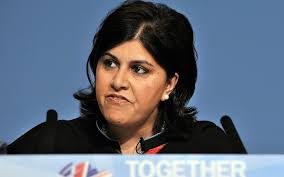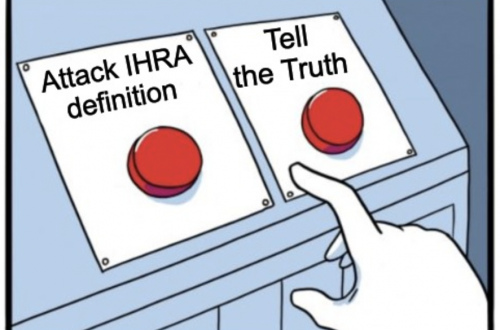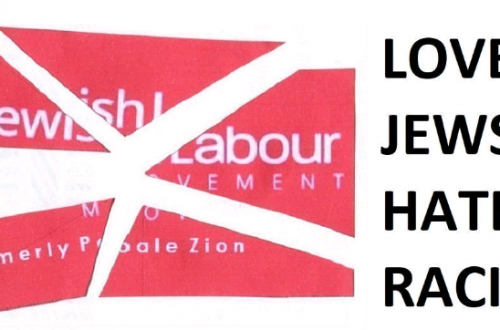This is a cross post by Douglas Murray
The original can be viewed here in The Spectator
Farewell then Sayeeda, Baroness Warsi. The most over-promoted, incapable and incompetent minister of recent times has finally done the nation one service and resigned. This morning she announced on Twitter that she can ‘no longer support government policy on Gaza.’ That would be government policy that now includes reviewing all arms export licenses to Israel? Not strong enough for Sayeeda, it would seem.
It was not hard to see this coming. Not just because Warsi’s Twitter activity in recent weeks has mainly consisted of pumping out support for Hamas-run Gaza and berating supporters of Israel for saying things she disagrees with, but also because she has shown a career-long sympathy for Hamas and other Islamic radicals.
In 2006, on an ‘Any Questions’ on BBC Radio 4, Warsi welcomed the election of Hamas in Gaza. This was after the group had killed hundreds of Israelis in suicide bomb attacks. Apparently unable to imagine that Hamas governing Gaza might be a problem, she said:
‘I think what’s happened in the Middle East with the election of Hamas is actually an opportunity and I think that’s the way we’ve got to see it. When groups that practice violence are suddenly propelled into power through a democratic process they get responsibility and responsibility can be a tremendously taming factor.’
Well, how wrong she was. Hamas used the opportunity of their poll ‘mandate’ to kill their Palestinian Fatah opponents in Gaza, stage a military coup and never hold another election. They then spent the money sent from abroad in aid of the Palestinian people to arm themselves with weapons to fire at Israel and to construct tunnel complexes to carry out terrorist attacks in Israel on Jewish holy days.
But Warsi’s ‘soft’ line on Hamas was just part of the broader picture. As the Times newspaper reported, back in 2006, in an article for the Asian newspaper Awaaz (written while she was vice-chairman of the Conservative Party)Warsi described the then Labour Government’s anti-terror proposals as ‘enough to tip any normal young man into the realms of a radicalized fanatic.’ And she wrote that ‘if terrorism is the use of violence against civilians, then where does that leave us in Iraq?’ In 2007 I discovered where she thought that left us. During a rather heated and angry Question Time, just after two car bombs had been placed outside a London nightclub on lady’s night, we got onto Iraq. I repeatedly asked Warsi to condemn the killing of British troops in Iraq. She repeatedly refused to do so. I don’t think I’ve ever had more emails from servicemen and women and their families, asking how it could be that a Conservative (then shadow) minister would not condemn the killing of British troops while they were on active service.
Warsi’s track-record of dubious support goes on. For instance, she expressed support for Kashmiri terrorist groups who she described as engaged infreedom fighting. And all the time she got away with it because she held herself out as the voice of the Muslims, and in particular of the ‘middle ground’. In fact she simply created this image by attacking people who almost anybody from the Muslim communities can attack — Anjem Choudary, al-Muhajiroun etc. But her interests were clearly not in trying to move opinion in a genuinely constructive direction. Increasingly as ‘minister of faith’ she used her position not to tackle the extremists who she should have been tackling but to persuade the UK government that it should make ‘a priority’ of tackling ‘Islamophobia’.
Her priorities remained skewed. When, earlier this year, she tried to put together a panel at the Foreign Office looking into ‘Religious Freedom’ (fine subject though this is at a time when Christians are being massacred and religiously ‘cleansed’ across two continents) those she invited to join it included the Muslim Brotherhood dauphin Tariq Ramadan.
Her time in government was filled with disasters. She repeatedly narrowly avoided being sacked. Her car-crashes mostly came over her attempts to develop what was effectively a parallel set of policies to those of the British government of which she was meant to be part. Word was that she had become increasingly angry after various reshuffles in which it became plain that she would never be given a ministry. She doubtless concocted in her mind various conspiracies as to why this might be, but the reason was single and obvious: she did not have the ability.
Realising that this ambition was to be thwarted, she manoeuvred to turn her position in Cabinet into one which was somehow meant to ‘represent’ Muslims. Purest, as well as dangerous nonsense. Everybody in Cabinet is there to represent everybody in Britain. But Warsi encouraged sectarianism rather than diminishing it. And where she could have used her position to side-line the extremists within Britain’s Muslim communities, she spent more of her time trying to stop people criticising the extremists within Britain’s Muslim communities. She was a notable behind-the-scenes critic of genuine Muslim reformers, in particular.
Warsi’s time in government set back the fight to detach the extremists from the majority, and repeatedly blurred the lines around extremism. She was promoted by David Cameron because of her sex and religious identity. Her fast-tracking into the Lords, Shadow Cabinet and then the Cabinet was identity politics at its most cynical and — in the end — counterproductive. David Cameron wanted to promote a Muslim woman, grabbed the first one he could see, and promoted her. She turned out to be a bad one. The only good thing is that, were David Cameron at all tempted to repeat this reach-out today he would find that there are actually talented, capable and inspiring minority ethnic candidates in his parliamentary party and elsewhere. Perhaps he will have learnt his lesson, in which case we might be able to declare the age of identity politics — epitomised by Sayeeda Warsi — as very happily over



